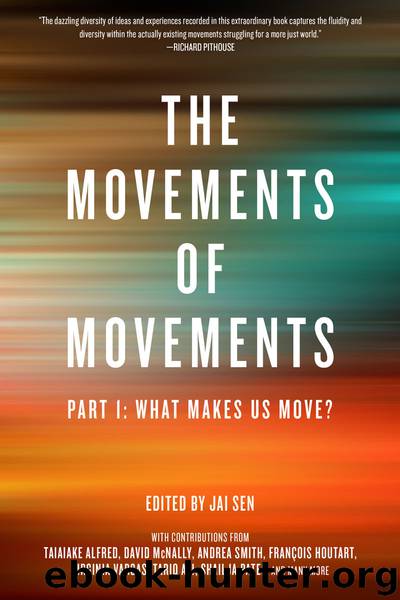Movements of Movements by Jai Sen

Author:Jai Sen
Language: eng
Format: epub
Publisher: Independent Publishers Group
Published: 2017-03-15T00:00:00+00:00
Muslim, Hindu, Buddhist, and Jewish Communities
For the last 500 years, since the beginnings of European modernisation and colonisation, there have been many movements of resistance and transformation within the world’s faith communities. But they have articulated their positions in the terms of their own traditions, including specifically religious or spiritual concerns. These have been targeted by secularist Western scholars and many political activists on the left as primitive, irrational, and conservative, relegated to the past, marginalised in the present, and banished from the future. So recovery of these absent traditions is central in the emergence of post-Eurocentric scholarship.19 Meanwhile, in terms of contemporary activism, there are proliferating signs of creativity and renewal within many communities, of multiplying faith-based NGOs, networks, and movements, and of their convergence and collaboration with other movements and coalitions in GSJM—global social justice movement—struggles. Here it is possible to cite only a few significant voices and coalitions.
Writing from a European perspective, for example, Muslim activist and scholar Tariq Ramadan insists that:
Islamic teachings are intrinsically opposed to the basic premises and the logic of the neoliberal capitalist system, and Muslims who live in ‘the system’s head’ have a greater responsibility, with others who are working toward the same goal, to propose solutions that could create a way out and lead to a more just economy and more equitable trade.20
In a similar spirit, from an Indian perspective, Muslim activist and scholar Ali Asghar Engineer wrote:
the Quran lays great emphasis on distributive justice. It is totally against accumulation and hoarding of wealth. It condemns accumulated wealth as strongly as possible. It also exhorts the people to spend to take care of orphans, widows, needy and the poor.21
He added that it “strengthens the social roots of peace by emphasising the role of need based economy and resolutely opposing greed based one”,22 and insisted that “social, political and economic justice is very essential for fighting religious fundamentalism” like that evident in Hindu nationalism.23
The Buddhist Peace Fellowship (BPF), with programmes in the US and Asia, articulates a vision of Buddhism as “a path of spiritual transformation and liberation”, to “free beings by ending contemporary suffering: racism, sexism, militarism, species-ism, economic oppression, caste and class, and the many other ways that society creates a collective me and mine, the sickness of grasping for which Dharma is the cure”.24 The BPF’s mission includes raising “humanitarian, environmental, and social justice concerns among Buddhist communities”, bringing “a Buddhist perspective to contemporary peace, environmental, and social justice movements”, and offering concrete “public witness through our practice, for peace and protection of all beings”.25 Occasionally, the BPF also issues public statements on pressing issues, like the war in Iraq and the dictatorship in Burma.26 The BPF also collaborates with DharmaNet International in promoting “engaged Buddhism” among groups around the world on a broad range of issues (including addiction recovery, ecological issues, gay and lesbian issues, women’s issues, and solidarity with Burma and Tibet).27
In Thailand, the Sathirakoses-Nagapradipa Foundation (SNF) is the legal body for five organisations committed to “struggle
Download
This site does not store any files on its server. We only index and link to content provided by other sites. Please contact the content providers to delete copyright contents if any and email us, we'll remove relevant links or contents immediately.
| Elections & Political Process | Ideologies & Doctrines |
| International & World Politics | Political Science |
| Public Affairs & Policy | Specific Topics |
| United States |
The Secret History by Donna Tartt(19023)
The Social Justice Warrior Handbook by Lisa De Pasquale(12182)
Thirteen Reasons Why by Jay Asher(8882)
This Is How You Lose Her by Junot Diaz(6869)
Weapons of Math Destruction by Cathy O'Neil(6260)
Zero to One by Peter Thiel(5782)
Beartown by Fredrik Backman(5729)
The Myth of the Strong Leader by Archie Brown(5491)
The Fire Next Time by James Baldwin(5421)
How Democracies Die by Steven Levitsky & Daniel Ziblatt(5209)
Promise Me, Dad by Joe Biden(5139)
Stone's Rules by Roger Stone(5078)
A Higher Loyalty: Truth, Lies, and Leadership by James Comey(4945)
100 Deadly Skills by Clint Emerson(4910)
Rise and Kill First by Ronen Bergman(4772)
Secrecy World by Jake Bernstein(4736)
The David Icke Guide to the Global Conspiracy (and how to end it) by David Icke(4696)
The Farm by Tom Rob Smith(4500)
The Doomsday Machine by Daniel Ellsberg(4480)
